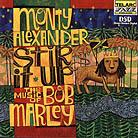July 1999
With Stir It Up, we’re talking about some of the most famous and beloved songs of the lion of Jamaica, Bob Marley. "Jammin’," "Could You Be Loved?," "Stir It Up," "Is this Love?" "No Woman No Cry," "I Shot the Sheriff": uniquely political music, rebellious, fiery, passionate, mystical even. To erase those lyrics is quite some castration. When the butcher becomes that most ill-suited of instruments, the piano, one wonders if this a heroic challenge, poor judgment or a lighthearted disregard for any such concerns? The artist attempting to solve this puzzle has genuine respect for his subject matter, having grown up in Kingston, Jamaica where he worked as a teenage studio musician in the late ‘50s. Monty Alexander knew of Bob Marley before anyone outside Jamaica ever did. A later influence occurred with Art Mooney’s Orchestra in Las Vegas, and stints with jazz giants Dizzy Gillespie, Clark Terry and Sonny Rollins followed. Some of Alexander’s latest projects include Natalie Cole’s Unforgettable tribute to her late father and the album Yard Movement, which launched the Island Jazz label. We thus know Marley’s music is in good hands. Still, can Alexander pull this one off? No, I’m sorry to say. There’s nothing wrong with the quality of Alexander’s playing or that of his band, mind you. These brothers are smooth, baby. Pass me a joint, mon. But that’s the problem. It’s the Las Vegas lounge-lizard treatment of the music that hurts this project, complete with white-lacquered Bösendorfer, the white tux and purple frill shirt. An imaginary band leader, over-aged and sun-tan, guides his late-night pros with minimal right-hand movements (left hand in pant pocket for that extra cool factor) and checks out the silicon-enhanced chicks in the isles each time he lights up the audience with his suave grin. But also let’s face reality: most of Marley’s songs are stylistically extremely simple -- there isn’t much you can do with them on a piano during the intro, especially when you’re essentially just transcribing the vocal line for the right hand. Marley wasn’t about finesse or complexity. He achieved near-prophet status just like most other prophets do -- speaking simply, truthfully, and standing behind his convictions and beliefs with ferocious integrity. But a piano just can’t sing such simple melodies without sounding trite or making us hope that the artist would transform the idea into something pianistic, and pronto. Those tracks that veer as fast as possible off the main highway to pursue jazzy side streets are the most successful, but even then we know these tunes too well not to miss Bob. We cry dilution rather than feel good about it. "Running Away" works reasonably well because of the driving rhythm that propels the whole tune forward, and because Alexander and his band leave the original score so far behind that we actually jump off the Rasta track, forget we’re in Marley country and just enjoy the ride. But on "Is this Love?" the piano introduces the simple melody with right-handed "shaking arpeggio cords" -- you know, the kind where thumb and little finger alternate their notes rapidly while the other fingers hold the chord identifiers? This is Vegas artifice at its shallowest, and is nearly sacrilegious. And how about Hammond organ pedals on "No Woman No Cry" while the upper-key piano melody does this tinkle-bit thing? Novel, yes. Well-executed? You bet. But I like my Caesar’s dressing the original way! Don’t substitute that salty li’l fish with honey-glazed macadamias! And so it goes -- very slick, very pro, but devoid of the intensity, charisma and passion that made Bob Marley the legend he is. The sound is demo quality, but who cares if the music is limp? Am I just missing the point? After all, Marley here is being buried by a Jamaican brother. Maybe he digs something that escapes this white boy. Sorry Monty, I like your playing a lot, but not here. Send me some original instrumental tunes and I will probably fall in love. But count me out on this one. GO BACK TO: |
 Monty Alexander
- Stir It Up: The Music of Bob Marley
Monty Alexander
- Stir It Up: The Music of Bob Marley![[Reviewed on CD]](../format/regcd.gif) Before
we begin to evaluate Monty Alexander’s pianistic tribute to Bob Marley, let’s
consider a danger inherent in any proposal where an instrument replaces the human voice.
For starters, even the most lyrical bel canto deliveries of cello, clarinet or saxophone
can at best approach but never truly replace the human voice’s unique expressiveness.
The last instrument to consider for the job is the piano. The attack and decay of a
plucked or struck string has precious little in common with a singer’s voice, unless
the singer has serious throat problems, that is. And, of course, forget about the lyrics.
Before
we begin to evaluate Monty Alexander’s pianistic tribute to Bob Marley, let’s
consider a danger inherent in any proposal where an instrument replaces the human voice.
For starters, even the most lyrical bel canto deliveries of cello, clarinet or saxophone
can at best approach but never truly replace the human voice’s unique expressiveness.
The last instrument to consider for the job is the piano. The attack and decay of a
plucked or struck string has precious little in common with a singer’s voice, unless
the singer has serious throat problems, that is. And, of course, forget about the lyrics.